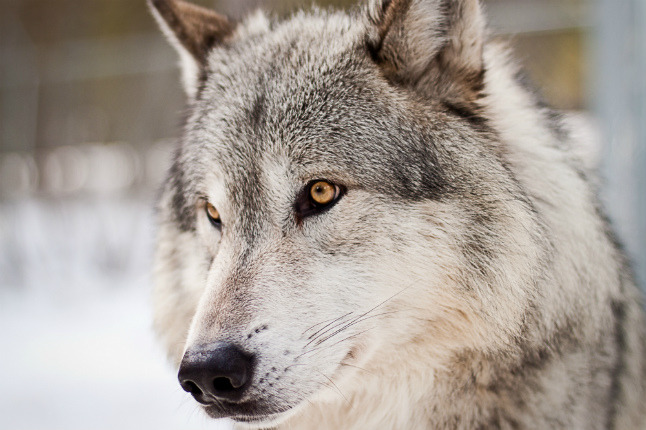Part Wolf, Part Dog: For Better Or Worse, He's Ours
I sit on the porch, waiting. It could go either way, because Aluco is part dog, part wolf, and one side will win out depending on the day. Today is a good day. Aluco steps toward me and lightly touches me with his black nose. Slowly, I extend my hand and pet him. I know that this is all I am going to get. Any sudden movement will cause him to shy away, though it is harder for him to move now.
Aluco's history is unknown, but it is obvious that some timber wolf blood runs through his veins. He has a sweeping tail, long legs and coarse brown fur shot through with gold. At the shelter, he was moved around in his pen with a noose and a pole. My husband, Jerry, could not leave him there, facing a certain death.
Jerry spent hours with Aluco, sleeping on the porch for months. Slowly, he was able to put a leash on him, then a pack on him for overnight trips. Aluco has come a long way. But he will never be the same kind of dog as the others, who freely tolerate me using them as pillows, who flop like fish into our bed. Instead Aluco keeps his distance, wary, afraid, half-wild.
This corner of Oregon is torn apart by the people who love wolves and those who hate them. The wolves slipped in from Idaho on their own, but there are people here who believe that the government brought them here in a deliberate plot to drive out the ranchers. There are people who refuse to walk the moraines that bracket Wallowa Lake because they are afraid of being taken down by wolves. This is a hard place to have a dog like Aluco.
The people who hate wolves are not bad people. They are people whose livelihood hangs on a thin balance. Under cover of night, wolves creep into their pastures and kill. These people see no value in wolves.
I don't debate this with them. Because of the choices I have made in my life, I can live with wolves in these mountains. Their howls add a touch of spice to the sweep of land dropping to the banks of the Imnaha River. Their tracks punctuate the snow on Tenderfoot Pass. I want them to survive here, but this is a wish I keep mostly to myself.
We drape Aluco in colorful flagging whenever we take him on trails, but people ignore his playful ribbons. They jump in fright at the mere sight of him. They put a hand on their rifles. I fear a shot in the woods, so we mostly go off-trail, in the places where people don't go.
There are times when I really wish Aluco were a different kind of dog. I want to lie next to him, listening to the bellows of his lungs. I want to be able to take him for trail runs along the moraine, on backpack trips into the wilderness. It makes me sad that he won't know the comfort and safety the other dogs do, lying sprawled by the fire.
"You have to accept him for what he is," Jerry says, and I know that he is right.
We are losing Aluco, slowly, an unknown problem causing his back legs to buckle. We are at the tipping point now. Do we drive him hours north of our small town for invasive procedures, or do we let him go? Jerry doesn't say so, but I can tell that his heart is breaking.
Loving Aluco has not been easy, and losing him won't be either. I can't shape him into the dog I want him to be, any more than I can transform this rugged and lonesome country into a place where everyone agrees on the virtue of an intact wilderness, where even the predators we fear and dislike are welcome. I can't make him better, either; eight years might be all we get. Sometimes I am dwarfed by all I do not know and cannot change.
Inside all of us beats an ancient drum, a reminder of a time when we were wilder than we are now. One at a time, we all came to the fire and were tamed. Every once in a while, something reminds us of that time, and for me it is loving Aluco. Running through the woods, when he could run, he was eclipsed by something like joy. He disappeared into the trees, striped black by shadow. He always came back when we called him, but I know that he is disappearing now and we won't see him again.
–
This essay first appeared in the High Country News.
